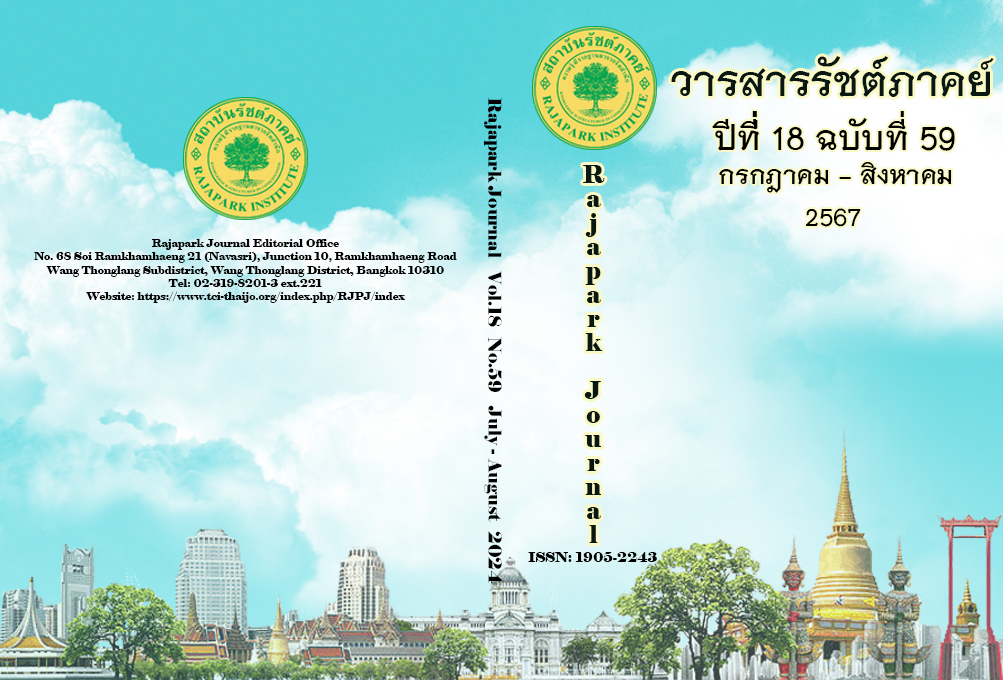The Role of Thailand Affecting the Effectiveness of the Political Conflict Management in Myanmar
Main Article Content
Abstract
This research aimed to: 1. examine the role of Thailand in affecting the effectiveness of political conflict management in Myanmar; and 2. compare the role of Thailand, ASEAN countries, and ASEAN+6 in affecting the effectiveness of political conflict management in Myanmar. The sample consisted of the key informants of the content interview, 3 focus groups, each consisting of 6 students in Lopburi, Srisaket, and Khonken provinces, and the non-participating observation of the researchers. Triangulation was used to analyze the data. They were selected by the chairman of ASEAN, the Prime Minister of Thailand, the President of the United States, the military leader of Myanmar, and the political leader of Myanmar. The instrument for collecting data was documentary data (the media content: news from websites and online content). The analysis of data is done through descriptive statistics and content analysis. The research results are as follows: 1) the role of rights and expectations in Thailand affecting the effectiveness of political conflict management in Myanmar; and 2) the role of ASEAN+6 (China) affecting the effectiveness of political conflict management in Myanmar.
Article Details

This work is licensed under a Creative Commons Attribution-NonCommercial-NoDerivatives 4.0 International License.
Views and opinions appearing in the Journal it is the responsibility of the author of the article, and does not constitute the view and responsibility of the editorial team.
References
Attamana, S.T. (1997). Public administration (3rd ed.). Thammasat University.
Bateman, T. S., & Organ, D. W. (1983). Job satisfaction and the good soldier: The relationship between affect and employee citizenship. Academic and Management Journal, 26, 587-595. http://dx.doi.org/10.2307/255908
Broom, L., & Selznick, P. (1963). Sociology: A text with adapted readings (3rd ed.). Harper & Row.
Dahl, R.A. (1967). Pluralist democracy in the United States: Conflict and consent (2nd ed.). Rand Mcnally & Co.
Galtung, J. (1990). Cultural violence. Journal of Peace Research, 27(3), 291-305. https://www.galtung-institut.de/wp-content/uploads/2015/12/Cultural-Violence-Galtung.pdf
Gibson, L. J., Ashby, M. F., Schajer, G. S., & Robertson, C. I. (1982). The mechanics of two-dimensional cellular materials. In Proceedings of the Royal Society of London. Series A, Mathematical and Physical Sciences, 382(1782), 25–42. http://www.jstor.org/stable/2397267
Hoy, W. K., & Miskel, C. G. (1991). Educational administration, theory, research and practice. McGraw-Hill.
Jandaeng, B., Kosolkittiampornand, S., & Kenaphoom, S. (2019). Factors affecting drug risk behavior of secondary school students in the boundary area of the Mekong basin. Journal of Yala Rajabhat University, 14(3), 425-432. https://so04.tci-thaijo.org/index.php/yru_ human/article/view/175134
Jaskyte, K., & Dressler, W. W. (2005). Organizational culture and innovation in nonprofit human service organizations. Administration in Social Work, 29(2), 23-41. https://doi.org/10.1300/J147v29n02_03
Kenton, B., & Penn, S. (2009). Change, conflict and community. Routledge.
Khunyotying, S. (2018). Guidelines for determining Thailand's strategy on security impacts caused by conflicts Wa ethnic minority group (United Wa State Party: UWSP). National Defense College.
Lindblom, C. E. (1968). The policy-making process. Prentice-Hall.
Patton, M. Q. (1999). Enhancing the quality and credibility of qualitative analysis. Health Services Research, 34, 1189-1208
Potipanya, K. (2016). Innovation capability affecting organization success to development of an accounting firm model in Thailand for the ASEAN economic community[Master’s thesis, Rajamangala University of Technology Thanyaburi]. http://www.repository.rmutt.ac.th/dspace/handle/123456789/3062
Prasanratkit, W. (2016). Transnational organized crime in Thailand: Mode, degree, severity and solutions. High-Level Justice Administration Executive Course (B.Y.S.)., Judicial Training Institute, Thailand.
Rojanapithayakorn, C. (2021). The 2021 coup in Myanmar and the rise of the drug problem in Thailand[Independent study, Chulalongkorn University]. https://digital.car.chula.ac.th/chulaetd/7900
Seashore, S. E., & Yuchtman, E. (1967). Factorial analysis of organizational performance. Administrative Science Quarterly, 12(3), 377–395. https://doi.org/10.2307/2391311
Steers, R.M. (1977). Organizational effectiveness: A behavioral view. Goodyear.
Steinberg, D.I. (2021). The military in Burma/Myanmar on the longevity of Tatmadaw rule and influence. Cambridge University Press.
Tanchai, W. (2020). National reconciliation. Journal of the King Prajadhipok's Institute, 10(1), 1-21.
The International Crisis Group. (2022, Jan 12). Myanmar’s coup shakes up its ethnic conflicts. https://www.crisisgroup.org/sites/default/files/319-myanmar-coup-ethnic-conflicts.pdf
Thompson, J.D., & Tuden, A. (1959). “Strategies, structures, and processes of organizational decision-making” in Thompson, J.D., et al., (eds.), Comparative studies in administration, The University of Pittsburgh Press.
Ua-amnoey, J. (2013). Inequality and injustice in the judicial process. In A. Ratanawaraha (Ed.), Inequality and injustice access to Thailand's basic resources and services (pp. 349), Chulalongkorn University.
Yutthaworakool, S. (2017). The politics of Buddhist nationalism in Myanmar: History, legitimacy and democratic transition. Journal of Social Sciences, 47(2), 133-148. http://www.library.polsci.chula.ac.th/journal2_issue/122/
Zammuto, R.F. (1982). Assessing organizational effectiveness: Systems change, adaptation and strategy. Suny Press.


